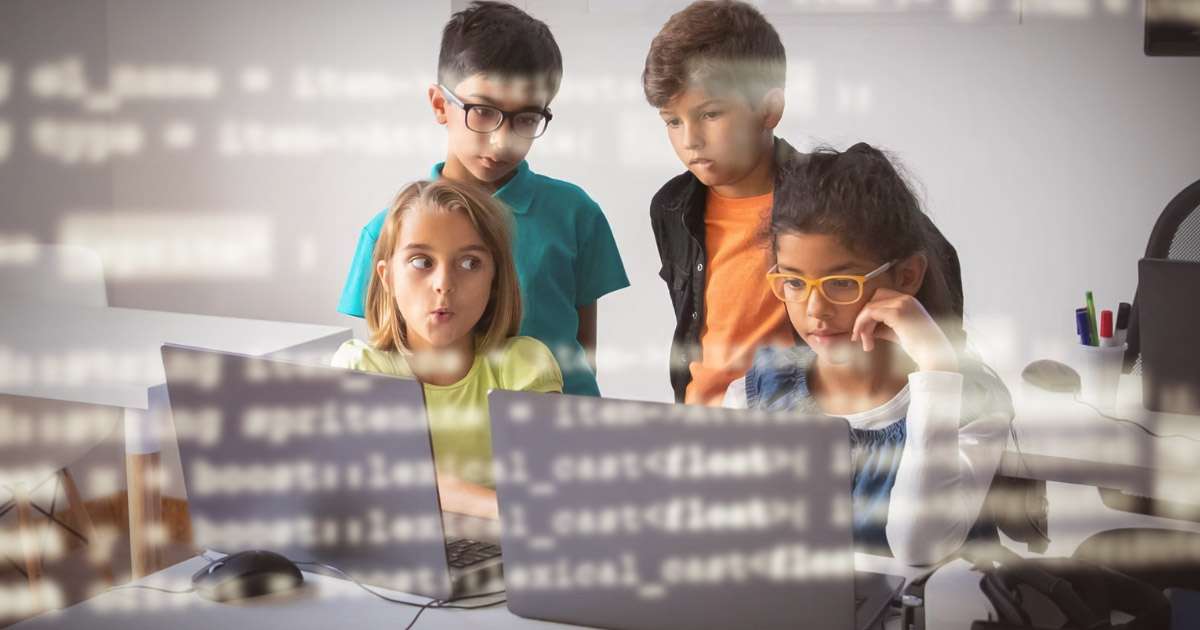Benefits of Coding for Kids: Why Is It Crucial for Kids’ Growth and Future Success?

Technology is part of everything we do, and kids are naturally curious about it. Surrounded by smart gadgets and digital tools, they want to understand and use technology more. While some people worry about kids spending too much time on screens, it’s clear that technology can greatly enhance learning and creativity when used wisely. Research shows that technology can boost thinking skills and inspire new ideas. So, it’s important to balance screen time with learning. Teaching kids to code is a great way to achieve this, as it helps them become creators, not just consumers, of technology.
What is Coding and How Does It Connect to Kids’ Learning?
Coding is like giving a computer a set of instructions, similar to telling someone how to bake a cake step by step. In schools, coding is becoming as important as reading or math. It helps kids understand the technology they use every day, which is becoming more important as technology becomes a bigger part of our lives.
These days, many kids want to learn coding because it lets them be creative and solve problems. They can make their own games, websites, and apps, which makes learning exciting and fun. This also helps them become creators of technology, not just users.
Kids coding involves fun activities that teach the basics of programming. Children enjoy coding because it lets them turn their ideas into real digital projects. This boosts their creativity and gives them the confidence to learn more.
Should Kids Learn to Code?
Absolutely, kids should learn to code! Coding is becoming a fundamental skill in our technology-driven world, and it can offer children numerous advantages that extend far beyond just computer screens.
Benefits of Learning to Code
- Enhances Problem-Solving Skills: Learning to code teaches kids how to approach problems methodically. They learn to break down complex issues into smaller, manageable parts and solve them step by step. This logical thinking is not only crucial for coding but also valuable in subjects like mathematics and science, and it can help kids in everyday decision-making.
- Boosts Creativity: Coding is a creative outlet where kids can bring their ideas to life. They can design their own games, animations, and apps, turning their imaginations into tangible projects. This process encourages experimentation and innovation, helping children develop a mindset that embraces creativity and originality.
- Prepares for Future Job Opportunities: As technology continues to evolve, many jobs will require some level of coding knowledge. By learning to code, kids are better prepared for the future job market, opening doors to careers in fields like software development, engineering, digital design, and more. Even in non-tech jobs, coding skills can be a valuable asset.
- Improves Understanding of Technology: Coding helps kids understand how the technology they use every day actually works. This understanding can demystify the digital world and empower children to not just consume technology but also create and modify it, giving them a deeper appreciation and insight into the devices and applications they interact with.
- Builds Confidence: Completing a coding project can give kids a strong sense of accomplishment. This boost in confidence can inspire them to tackle new challenges and take risks in other areas of their lives, fostering a positive attitude towards learning and personal growth.
- Encourages Collaboration: Many coding activities require teamwork, where kids learn to communicate their ideas and work together to solve problems. This collaborative environment not only builds social skills but also teaches them how to value diverse perspectives and contributions, essential skills in any group setting.
- Promotes Persistence and Resilience: Coding often involves trial and error. Kids learn that making mistakes is part of the process and that perseverance is key to finding a solution. This resilience helps them develop a growth mindset, where they understand that effort and persistence lead to improvement and success.
How to Introduce Your Children to the Joy of Coding
Getting kids excited about coding can be a fun journey that blends learning with play. Here are some simple ways to introduce them to coding:
- Educational Games and Apps: Start with games and apps designed to make coding feel like play. These tools, like “Minecraft” and “Scratch,” let kids create their own stories, games, or animations. They make learning coding basics feel like a fun challenge.
- School Coding Classes or Clubs: Check if your child’s school offers coding classes or clubs. These programs teach kids in a group setting, which can be more fun and engaging. Kids get to learn with friends and share their excitement about coding.
- Online Courses: Online courses are great because kids can learn at their own pace. Websites like “Code.org” have free lessons that show kids how to code step-by-step. They can try different projects and even pause when they need a break.
- Coding Camps: Coding camps are like mini-adventures where children can focus on coding for a few days or weeks. These camps, often held during holidays, let kids dive into projects like designing games or apps with help from instructors.
Future Career Benefits of Coding for Kids
Today, technology is everywhere, and learning to code can give kids a great start. When children begin coding early, they develop important skills like problem-solving, creativity, and resilience. These skills are useful not just in tech jobs but in any career they might choose.
Starting with coding helps kids learn in a fun way, boosting their confidence as they figure out how to solve problems and build their own projects. This hands-on experience prepares them for future job opportunities and helps them think creatively and critically—skills that are needed today.
Our children’s future leaders and prosperous creators are made possible by our early investment in their coding education. Encouraging kids to learn coding today sets them on a path to becoming the innovative thinkers and problem-solvers of tomorrow.

